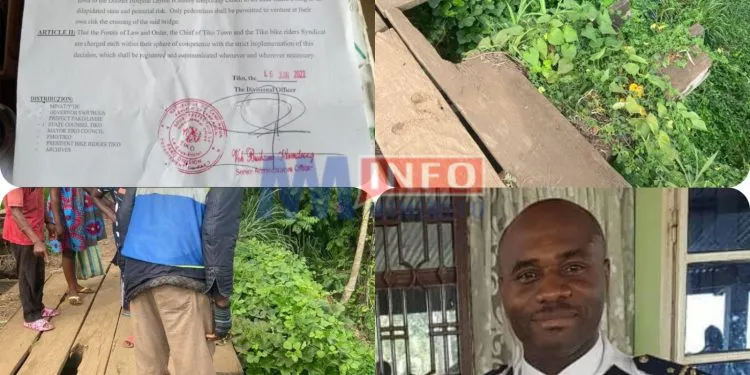By David Atangana
The Divisional Officer (DO) for Tiko Sub Division, Voh Buikame Kawa Armstrong, has confirmed that the government would rather punish the population than perform its constitutional duties.
The DO did this in his reaction to the recent accident that nearly claimed the lives of three people as a result of the dilapidated nature of the bridge linking Tiko town to the District Hospital.
Rather than solve the problem by constructing a workable bridge, the administrator felt the right decision was to ban commercial motorcycle riders from using the bridge to access the Tiko District Hospital.
The information is contained in a communique signed by Voh Buikame Kawa Armstrong, the civil administrator for the Tiko Sub Division, Fako Division South West Region, Cameroon.
According to the administrator, the move aims at avoiding the risk posed by a dilapidated bridge linking Tiko town and the district hospital.
“That with effect from the date of signature of the present decision, the bridge linking Tiko town to the Tiko district hospital layout is hereby temporarily closed to all bike riders owing to its dilapidated state and potential risk. Only pedestrians shall be permitted to venture at their own risks the crossing of the said bridge,” the DO said in the release.
Counting on the collaboration of locals, the Divisional Officer has tasked the forces of law and order and the traditional administration to ensure the strict implementation of the said order.
The banning of commercial motorcycles, which provide one of the fastest means of public transport for locals who seek to access the hospital, and failing to provide an alternative, the D.O has just provided a sticking-plaster solution.
Such a temporary and inadequate approach to a serious problem goes contrary to sections of the Cameroon constitution which stipulates that “the duty of regional and local authorities shall be to promote the economic, social, health, educational, cultural, and sports development…”.
This decision which shifts the responsibility to the bike riders and pedestrians, raises fundamental questions as to what the function of the local administration is, if it cannot ensure the safety and security of the population.



